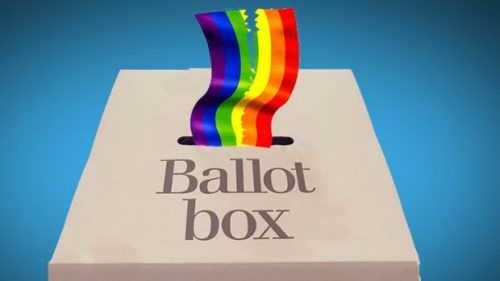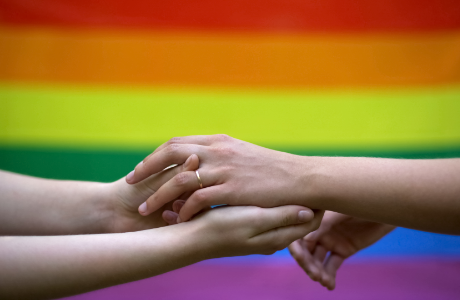Unless a High Court challenge is successful Australians who are on the electoral role will receive envelopes posted by the Australian Bureau of Statistics from September 12 to have a say on same-sex marriage. Responses will be due by 7 November and a result announced on 15 November. The nation is divided on whether this is a good idea but if this is the only way forward on this issue, I encourage you to have your say and cast a vote.
In this blog, I want to outline some considerations on the postal vote that I hope will be helpful in thinking this through and having conversations with others especially when they disagree. I also encourage you to read my blog Thoughts on Same-Sex Marriage. [1]
It’s important to note from the start, same-sex marriage is not merely an “issue”. This debate involves people – people who God loves, people made in God’s image, people who are in our churches, that you’re related to and that you meet in everyday life.
Jesus is at the heart of Christian unity
This is the most important thing to remember at all times. Christians have disagreed on many things over the centuries and sometimes those disagreements have led to poor behaviour and outcomes. For example, both John Calvin and Martin Luther advocated for the death of anyone they considered to be heretics (read: “anyone who disagrees with me” – sound familiar?) While Christians don’t usually kill each other these days, there are many keyboard warriors, preachers and others whose words hurt and wound. Jesus is at the heart of Christian unity – who He is, what He’s done and what He continues to do. These are non-negotiable to the Christian faith. People don’t go to heaven or hell for what they believe about same-sex marriage.
Voting is a secret ballot
I’m amazed at the number of individuals who ask others what they’ll vote in this SECRET ballot. You don’t have to tell anyone what you intend to vote. I heard of a pastor who, last weekend, “implored” his people to vote “no.” It’s my opinion that this pastor is going beyond his authority in doing this. I never tell people what I vote, and neither do I instruct them on how to vote. The church is beyond politics. Our message and mandate are from another place; we are citizens of heaven and called to be ambassadors who bring heaven to earth. In any church, there will be people of various political persuasions and who have differing views on ethical issues. Disunity occurs when church leaders fail to recognise this.
Don’t be critical of others’ relationships
My understanding of the Bible leads me to believe that heterosexual marriage is a relationship that is like no other. The coming together of a man and a woman in sacred marriage is a covenant that reflects both the image of God and the relationship that exists between Jesus and His church. It is a relationship where children can be born and raised by both of their biological parents. But my beliefs do not cause me to criticise or demean other people’s relationships. Over my 40 years as a Christian, I’ve watched the church grapple with accepting divorced and remarried people and single parent families. We now freely welcome such people into our churches (well at least most churches). People find themselves as single parents for all sorts of reasons, and they should never be made to feel like second-class citizens. Neither should couples whom for whatever reason can’t have or choose not to have children.
The Bible often speaks critically of divorce and remarriage, but we have come to realise there are higher laws that come into operation such as “Love your neighbour as yourself” and “treat others the same way you want them to treat you.” We need to apply these greater laws to same-sex couples and singles who want to be part of a church community and grow in their relationship with God and others. Remember, “a Christian’s job is not to be right about the Bible, our aim should be to fulfil Scripture.” [2] Some gay and lesbian couples and individuals have children, and the church has a responsibility to minister to those children as well. It would not be helpful to the kids for their parents’ relationship status to be criticised by their church.
Sometimes the Bible is just not clear
If I had a dollar for every time I’ve heard or read, “the Bible clearly states …” I’d be a very wealthy man. Sometimes the Bible is clear, but on many things, it isn’t. A favourite book series of mine is Counterpoints by Zondervan publishers. [3] This set contains over 30 titles that deal with many views on various subjects. There are four views on hell, three views on creation and evolution, four views of baptism and two views of women in ministry (yes and no) to name a few. While the Bible is clear on the unique relationship between a husband and wife, it is not as clear on some other relationships. Read my blog, “The changing face of marriage” for more on this. [4]
Like it or not, there are various views on the six verses in the Bible that appear to condemn homosexuality. Those who take these verses literally and at face value should not be condemned as bigots and homophobes while those who come to a different conclusion should not be labelled revisionist or heretical. People on both sides of this debate have studied the context, history and culture of these Scriptures and come to differing conclusions. Some people do not see these verses as condemning of loving, monogamous same-sex relationships while others do. I encourage you to read widely and come to your conclusions – and allow others to do the same.
Beware of outraged Christians
Lately, I’ve seen an increasing number of blogs and social media posts from outraged Christians, often posted and shared with little or no fact-checking, and all they do is distort the truth and create fear. I think that’s the intended outcome and I don’t believe that is a good way for Christian people to behave. For example, a recent email from the Australian Christian Lobby is titled, “It’s under attack” and includes a quote from Professor Jordan Peterson, a psychologist and academic at the University of Toronto. Professor Peterson has become somewhat of an online celebrity in speaking out against political correctness (and is making a lot of money in the process). The ACL says, “In the wake of same-sex marriage, Canada passed a new law making it a criminal offense for you to refuse to call someone by their “chosen” gender pronoun. Refuse to bow to such rainbow totalitarianism by LGBTI activists and you could suffer legal prosecution.” These claims are inaccurate as another academic at the University of Toronto shows [5] but they have been shared over and over by outraged Christians who fail to check their facts.
The “slippery slope” argument also attempts to instil fear, that is, if we allow “A” to happen then “X, Y & Z” will inevitably follow. This fear causes people to fight to protect “A” at all costs.
Not all gay people want same-sex marriage
To think that all gay people are for same-sex marriage and all Christians are against is just wrong. I’ve chatted with some gay and lesbian individuals who don’t support same-sex marriage. One guy told me he thought of marriage as a heterosexual institution and wanted nothing to do with it. One thing that is important to understand is that in countries where same-sex marriage is legal there’s a minimal uptake of it. For example in the UK, civil partnerships, rather than marriage, are still preferred by the majority of straight and gay couples. In Australia, about 3% of the population identify as other than heterosexual. The last census indicated there were 33,714 same-sex couples and 4,650,986 opposite sex couples. Considering that most of the same-sex couples won’t get married, I sometimes have the feeling we’re creating a storm in a teacup – albeit a costly storm.
Everyone needs to compromise
It is my belief that sooner or later same-sex marriage will become law in Australia. That being the case it’s of vital importance that any legislation is carefully framed. The Australian Government has to govern for all people but in any decision there will naturally be some who are happy with the outcome while others are not. There will be winners and losers – the winners must choose not to gloat and the losers must lose well. In the meantime, compromises need to be made. The trouble is that people on the extremes don’t like to compromise. Such was the case recently when Federal Member for Goldstein, Tim Wilson, along with Patrick Parkinson put forward a bill that defined two kinds of marriage – religious (sacred) marriage and civil marriage. This bill offered widespread religious freedoms not contained in the other two bills (the Dean Smith Bill and the George Brandis Bill). Some gay extremists, some conservative politicians and the Australian Christian Lobby rejected this Bill because they refuse to compromise. In doing this, the losers may get little or nothing.
Finally, as mentioned previously, it’s important in all our dealings that we don’t see this as merely an issue. This is a debate about people whom God loves. And so any discussions have to be tempered with grace, understanding, and respect and include the Christian qualities of tolerance, kindness and patience because that reflects the nature of God. [6]
[1] https://baysidechurch.com.au/thoughts-on-same-sex-marriage/
[2] Shane Willard, Getting Unstuck https://baysidechurch.com.au/message/getting-unstuck-ps-shane-willard/
[3] http://www.zondervan.com/the-counterpoints-library-complete-32-volume-set
[4] https://baysidechurch.com.au/the-changing-face-of-marriage/
[5] http://sds.utoronto.ca/blog/bill-c-16-no-its-not-about-criminalizing-pronoun-misuse/
[6] Romans 2:4





 ABOUT ROB BUCKINGHAM
ABOUT ROB BUCKINGHAM

